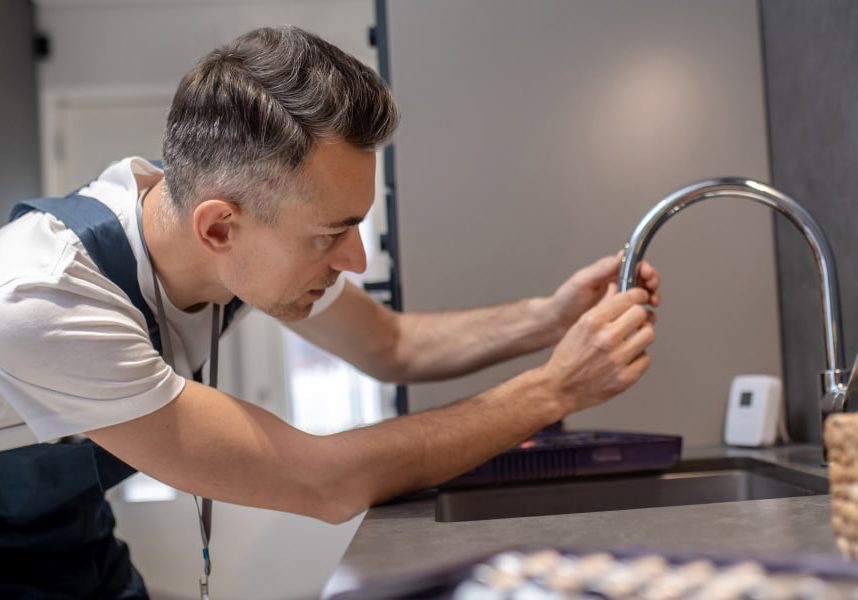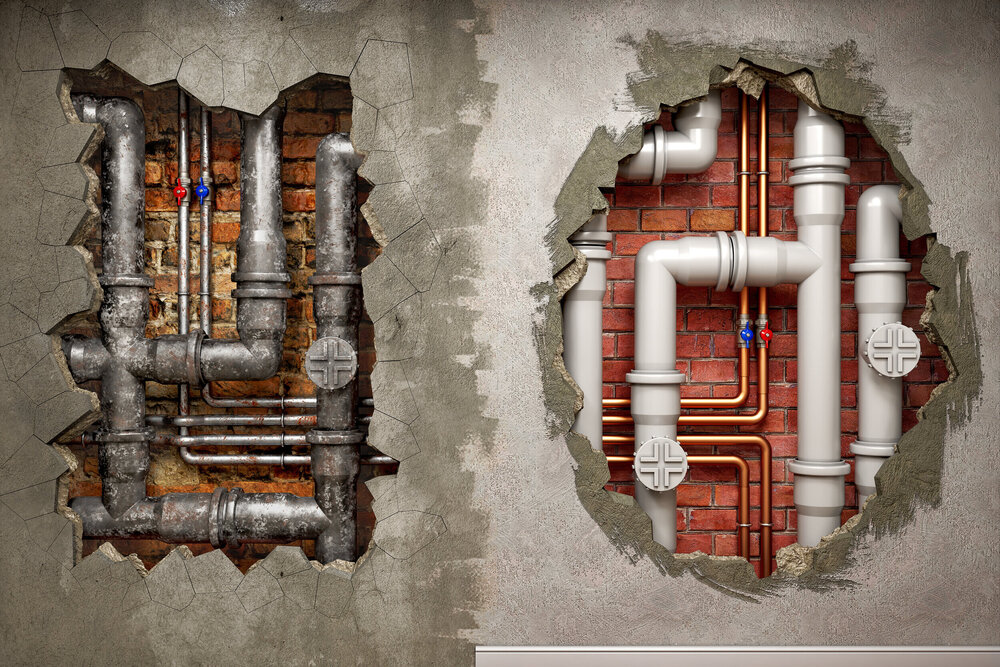Ways To Prevent A Leaky Faucet
The frequent problem of a leaky faucet, such as a leaking bathtub or shower faucet, may affect homeowners. If ignored, a leaking faucet can waste water and result in expensive plumbing repairs. To avoid this, it’s imperative to learn how to stop a faucet drip and fix a leaky faucet, especially a ball valve or ball-type faucet.
Homeowners can reduce their water costs and avert costly plumbing repairs by performing routine maintenance and promptly fixing leaks. Thus, take the time to understand how to fix a leaky faucet if you’re wondering why my kitchen faucet is leaking or “how to repair a leaking shower faucet” to avoid any plumbing issues.
Causes Of Faucet Leakage
Several factors might cause a faucet to leak. While some issues are avoidable, others require expert repair services. Internal corrosion, mineral buildup, and faulty components are typical reasons for leaking faucet pipes.
Internal corrosion can happen when the chemical makeup of the water deteriorates the metal, resulting in tiny fissures or holes that allow water to leak out. Hard water mineral accumulation can result in clogs and leaks, and worn-out components like O-rings, washers, and seals can also cause leaks.
Internal Corrosion
A frequent plumbing problem that has several potential causes is leaking faucets. Internal corrosion is one of the leading causes of faucet leaks. The quality of the water and its chemical makeup are frequently the root of this issue. Your faucet’s metal may corrode and degrade over time if the water has a high pH level or includes chemicals that react with it.
Little cracks or holes in the faucet caused by internal corrosion may eventually result in a kitchen faucet leak. Internal corrosion is problematic because it can frequently go undetected until significant harm has already been done. Because of this, it’s crucial to take precautions to halt corrosion before it begins.
Leaking faucets, such as kitchen faucets or sink faucets, are common plumbing issues that can lead to water wastage and expensive repairs. To avoid such problems, it’s essential to fix faucet leaks and repair leaky faucets promptly. This also applies to fixing a leaking shower faucet, a toilet faucet, or any other kind of faucet pipe or valve leaking.
Old faucet leaking can be a common issue that requires immediate attention to avoid further damage. It’s important to understand why faucets leak, as internal corrosion is often the culprit. By taking preventive measures and addressing the issue promptly, you can stop a leaking faucet and save time, money, and hassle in the long run.
Mineral Build-Up
If you’re experiencing sink faucets or any other kind of leaking faucet, it could be due to the minerals in hard water. Calcium and magnesium buildup from hard water can cause clogs and leaks inside the faucet over time, leading to decreased water pressure and flow. To stop a leaking faucet caused by mineral accumulation, consider adding a water softener to remove excess minerals from the water. Regularly cleaning the faucet with vinegar can also remove mineral deposits and prevent costly repairs. By taking preventive actions like installing a water filter and cleaning the faucet frequently, you can increase its lifespan and avoid leaks caused by mineral buildup.
Failed Parts
Any plumbing system would be incomplete without faucets, but they can be very frustrating when they begin to leak. Failed components, including O-rings, washers, and seals, are among the most frequent causes of faucet leaks. These components may deteriorate with time, resulting in damage and the release of water from the faucet.
It’s essential to call a qualified plumber to fix your faucet as soon as you notice a leak. Self-help attempts often result in additional damage and more expensive future repairs. A skilled plumber can quickly and effectively identify the issue and replace any damaged components, ensuring your faucet is functioning properly and avoiding any more leaks.
You should fix a leaking shower faucet right away if you notice one. Contact a reputable plumbing provider to provide repair service and maintain the proper operation of your plumbing system.
How To Prevent A Leaking Faucet
Preventing a leaky faucet is easier than you might think. By taking a few simple steps, you can reduce the risk of faucet leakage and extend the life of your plumbing system.
Check Your Water Pressure
Leaky faucets are frequently caused by high water pressure. The internal parts of the faucet are stressed by excessive water pressure, which accelerates their wear and eventually leaks. Use a water pressure tester to gauge the pressure if you believe that high water pressure is to blame for your leaky faucet. Residential water pressure should normally be between 40 and 80 PSI (pounds per square inch). Consider adding a pressure-reducing faucet valve leaking to lower the pressure to a safe level if it is higher than this.
Leaky faucets are frequently caused by high water pressure. The internal parts of the faucet are stressed by excessive water pressure, which accelerates their wear and eventually leaks. Use a water pressure tester to gauge the pressure if you believe that high water pressure is to blame for your leaky faucet.
Residential water pressure should normally be between 40 and 80 PSI (pounds per square inch). If it is higher than this, consider adding a pressure-reducing valve to lower the pressure to a safe level.
Evaluate Water Hardness
If you reside in a region with hard water, mineral accumulation may cause your faucets to leak and your water flow to be lower. Installing a water softener is one efficient way to stop mineral accumulation. A water softener removes the minerals that lead to hard water and replaces them with sodium ions.
By softening your water, you can lessen the possibility of leaks and lengthen the lifespan of your faucets. Soft water can also be advantageous for greater soap lathering, brighter clothing, and cleaner dishes. Consider installing a water softener to safeguard your faucets and benefit from soft water.
Keep Your Faucet Dry
Corrosion can flourish in an atmosphere created by standing water, and this corrosion might eventually cause leaks in your faucet. To prevent standing water, it is crucial to keep your faucet dry after each use.
Corrosion and other kinds of damage can be avoided by using a dry towel to wipe off the faucet’s surface after each use. Regular faucet cleaning can also aid in preventing mineral buildup and other problems that might result in sink faucets leaking.
The surface and internal parts of the faucet can be cleaned with a soft cloth and a light cleaning agent. By following these easy procedures, you can prevent faucet leaks and keep your plumbing system in good working order.
Stop Water At The Source
If you notice a kitchen faucet leak, immediately turn off the water supply. This will prevent further damage and save water until the problem is fixed. Prompt repairs can also prevent more expensive repairs down the line.
Repair A Leaky Faucet With Fischer Plumbers
Fischer Plumbing provides extensive faucet repair services. Whether it’s a leaky sink faucet, shower faucet, bathtub faucet, or kitchen faucet, our skilled plumbers can identify the issue and offer a workable remedy right away. We also fix faucet pipe leaks and leaking valves.
Fixing leaky faucets as soon as possible is critical to avoid further damage and water waste. We know how annoying and disruptive a dripping faucet may be to your everyday routine. Our plumbing specialists employ the most recent technology and tools to quickly and effectively repair and mend faucet leaks.
Our crew will first determine the source of the leak, which could be caused by a few things, including worn-out components, mineral accumulation, or high-water pressure.
Our plumbers are skilled in fixing various varieties of faucets, including ball-type faucets, and provide a durable remedy.
Also, we can fix leaking shower and toilet faucets, which are frequent sources of leaks in homes. We can repair leaky faucets from damaged valves, worn-out seals, or rust. We only utilize high-quality replacement parts to ensure successful and durable repair.
We offer services for installing new faucets, maintaining old leaking ones, and fixing leaky faucets. Our plumbing professionals can recommend the ideal type of faucet for your needs and budget. They can also perform routine maintenance to stop leaks before they start.
Do not hesitate to contact Fischer Plumbing if your sink faucets are leaking. Our knowledgeable plumbers are on call around the clock to perform urgent repair services and guarantee your plumbing system.

Call The Professionals
Call Fischer Plumbing Right Away And Get The Best Sewer Line Repair Service At Your Doorstep.
FREQUENTLY ASKED QUESTIONS
To stop a bathtub faucet from dripping, you must first determine what is causing the leak. It could be caused by mineral accumulation inside the faucet or by worn-out or damaged washers, O-rings, or valves. Once you’ve determined the root of the problem, you can repair the broken components, remove the mineral buildup, or get assistance from a licensed plumber.
There are a few causes of bathtub faucet leakage, including internal corrosion, mineral accumulation, or damaged parts. High water pressure may also be to blame because it may hasten the internal faucet component wear and tear.
You must switch off the water supply to your bathtub before attempting to repair leaky faucets. This will stop the water flow while you fix the faucet and prevent flooding or water damage.
You must first determine what is causing the leak before you can stop a leaking faucet. It could be caused by mineral accumulation inside the faucet or by worn-out or damaged washers, O-rings, or valves. Once you’ve determined the root of the problem, you can repair the broken components, remove the mineral buildup, or get assistance from a licensed plumber.
A worn-out or defective valve or cartridge may be to blame for a running bathtub faucet. It might also result from an obstruction in the water line or an issue with the water pressure regulator. To solve the problem.
If your bathtub faucet drips even after you turn it off, it may indicate a worn-out or defective valve or cartridge. Mineral accumulation inside the faucet can also cause this, keeping the valve from properly sealing.
Worn-out or damaged washers, O-rings, or valves are the most typical cause of leaky faucets. Due to prolonged use or mineral buildup inside the faucet, these components may eventually become worn out.
You can use silicone sealant, Teflon tape, or a plumber’s putty to seal a bathtub faucet. Use the proper sealant for your faucet and follow the manufacturer’s directions closely.









